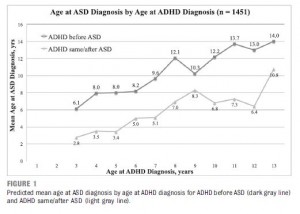Autism and ADHD can share many common features, and both disorders are being diagnosed more frequently compared to previous decades. Making matters more complicated is the accumulating evidence that the two disorders may share some underlying genetics and neurobiology. While autism is optimally diagnosed when children are around two years of age, many are not diagnosed until much later which represents a lost opportunity for early intervention. Some preliminary evidence suggests that one factor that is related to a delayed diagnosis of autism is the presence of other psychiatric and developmental problems. This study, recently published in Pediatrics, examines specifically the association between the age of autism diagnosis and presence of an ADHD diagnosis.
The data come from the National Survey of Children’s Health in the years 2011-2012. This survey was conducted by randomly calling households in all 50 states. The response rate was 23%. From  an initial calling of over 85,000 households, a final sample of nearly 1500 autistic children between the ages of 2 and 17 was identified. The main variable of interest was whether or not a child had also been given a diagnosis of ADHD and the specific ages that the two diagnoses were given. Other factors such as illness severity were recorded an controlled for in some of the analyses.
an initial calling of over 85,000 households, a final sample of nearly 1500 autistic children between the ages of 2 and 17 was identified. The main variable of interest was whether or not a child had also been given a diagnosis of ADHD and the specific ages that the two diagnoses were given. Other factors such as illness severity were recorded an controlled for in some of the analyses.
A total of 42.9% of the autistic sample had also received an ADHD diagnosis, with slightly less than half of that number receiving the ADHD diagnosis first. In those cases in which ADHD was diagnosed first, the autism diagnosis was found to occur roughly 3 years later compared to children in which the ADHD diagnosis came at the same time or after the autism diagnosis, controlling for other variables. Examined another way, children in whom the ADHD diagnosis came first were found to be nearly 30 times more likely to have their autism diagnosis come after the age of 6. While an older age of diagnosis was found to be related to less severe autism, the delay in autism diagnosis among children first diagnosed with ADHD was found regardless of the severity of the autism or ADHD symptoms.
The authors concluded that the presence of ADHD symptoms could cause a delay in an autism diagnosis. They advise clinicians to consider autism in young children who present with ADHD symptoms.
This study raises an important issue in clinical practice, and supports the idea that clinicians may not be as vigilant about autism when a child has symptoms of ADHD. I’ve tried to train myself (and teach others) that seeing a young child with OCD behaviors should trigger some additional investigation about autism, but thinking the same way for ADHD behaviors is new.
There was one aspect of the study that was puzzling to me and not well discussed. From the Discussion section, one gets the impression is that the way this all works is that once a child receives a diagnosis of ADHD then subsequent behaviors are viewed through an “ADHD lens” which in turn causes less diligence to search for other potential diagnoses such as autism. However, in reading the fine print (specifically Table 1) it appears that the mean age of a child receiving a diagnosis of ADHD was about 6, which is well beyond the period that autism screening and assessment is recommended. Thus, it does not appear that the presence of the ADHD diagnosis itself is clouding judgements about an autism diagnosis but rather something else. What could that be? The article doesn’t really say. Perhaps there is something about early emerging ADHD behaviors that are particularly salient and that may mask more subtle autistic symptoms. More work needs to be done to figure out what really is going on here.
Reference
Miodovnik A, et al. Timing of the Diagnosis of Attention-Deficit/Hyperactivity Disorder and Autism Spectrum Disorder. Pediatrics 2015; epub ahead of print.
Tags: adhd, ASD, asperger's, autism

